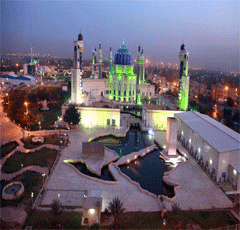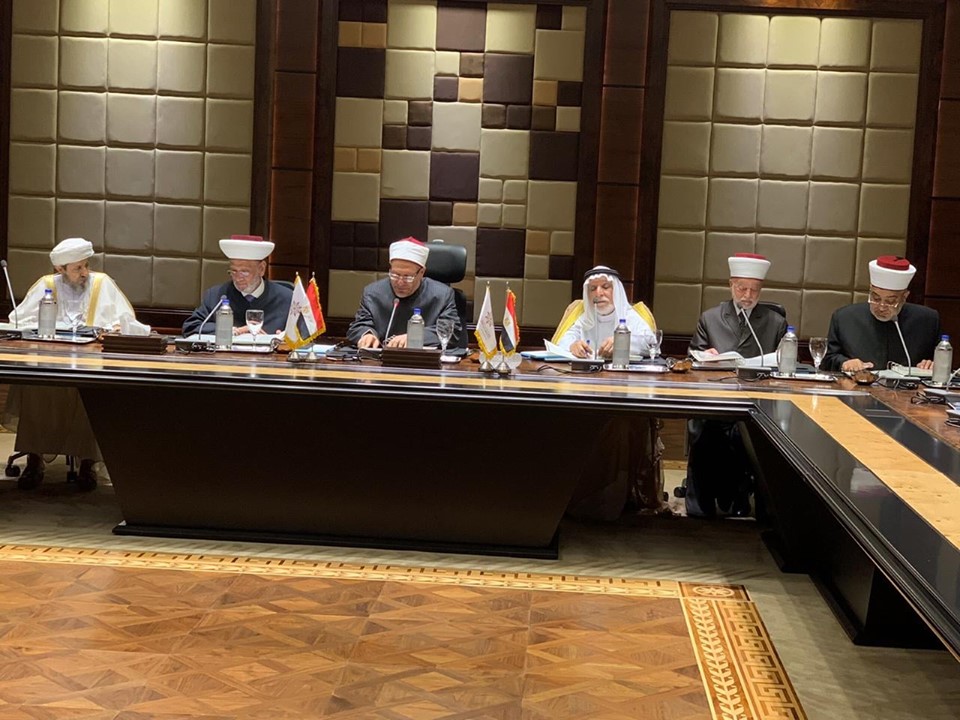In the presence of Dr. Al-Hammam. The Conference of the Secretariat of the World’s Eftaa institutes concludes its activities in Cairo with a number of resolutions and recommendations
In the presence of the Head of the Sunni Endowment Office, Sheikh Dr. Abdul Latif Al-hemyam, concluded the World Conference of the General Secretariat of The World’s Eftaa institutes in the world under the title “The Civilized Management of the Doctrinal Dispute”,
which was held in The Egyptian capital Cairo with the participation of a group of Scientists, muftis and researchers from different countries of the world, where the conference sessions, workshops and projects were enriched by their research and important discussions and useful interventions.
The final statement of the conference was delivered by the Grand Mufti of the Arab Republic of Egypt, Dr. Shawky Allam.
In its sessions, researches, discussions and workshops, the conference presented the issue of difference and the results of its management that vary depending on the way it is handled and invested for the benefit of the human being, especially in its doctrinal and Eftaa aspect.
The themes of the conference dealt with a number of important topics, and the themes came as follows:
The first axis: the theorizing framework of the civilized management of the doctrinal dispute.
The second axis: the history of the management of the jurisprudential dispute. View and criticism.
The third axis: the consideration of purposes and the management of the doctrinal dispute, the systematic framework.
The fourth axis: the management of the doctrinal dispute, reality and hope.
On the sidelines of the conference sessions, a series of workshops were held to train and interact on the following:
Workshop 1: Presentation of the results of the Global Fatwa Index.
Workshop 2: Fatwa and Information Technology.
Workshop 3: Mechanisms for dealing with islamophobia.
The fifth World Fatwa Conference achieved the following:
- Renewing the consideration of the doctrinal dispute to be the beginning of a solution to contemporary problems instead of being a part of them.
- Identifying cultural assets and contemporary mechanisms to deal with dispute issues .
- Activate the acquaintance between the workers in the field of fatwas in different scientific schools.
- To announce an effective and practical mechanism for the investment of civil society institutions, jurisprudential disputes in the field of human rights, and all social and humanitarian areas.
- Develop a range of ideas that embrace the establishment of media programs and social activities involving scholars of different faiths, guiding their followers to renounce intolerance, and supporting the cause of doctrinal tolerance.
The Fatwa Conference launched a number of initiatives in the context of the civilized management of the jurisprudential dispute in particular, and in the area of fatwas in general, which included:
- The declaration of the document “Doctrinal and Eftaa tolerance” to be the first document to regulate the matter of jurisprudential difference, support tolerance and renounce intolerance, and are agreed upon by those concerned with the matter of fatwas.
- World Fatwa Day.
- The announcement of the Imam Al-Qarafi Award for Fatwa Excellence.
- Issuing a range of printed and computer books and encyclopedias that support the institutional excellence of the role and bodies of fatwas and the advancement of Eftaa studies, including: quality management in Eftaa institutions, human resources management in Fatwa institutions, and encyclopedia of fatwa sciences in language English, a detailed view of mental maps of the code of fatwas.
Recommendations and decisions that resulted from the fatwa conference:
First: The conference appreciates the efforts of the General Secretariat for the role of the Eftaa appreciates its predecessor to gather the word of those concerned in the world to rationalize and invest this dispute.
Secondly, the conference supports its effective initiatives by allocating an international day for fatwas, allocating the Imam Al-Qurafi Award for fatwa excellence, and issuing a document of doctrinal and fatwa tolerance, and calling on all parties concerned to abide by them and activate them on all sides.
Thirdly, the conference participants of all faiths and countries affirm that human difference is destiny and civilizational, and that the attempt to deny it is a denial of the divine will in creation: “If your Lord wishes to make people one nation and still different” [Hood: 118].
Fourth: The conference affirms that the civilized management of the doctrinal dispute is the best way to invest it for the benefit of humanity.
Fifth: The conference confirms that the history of jurisprudential difference has gone through varying periods of ups and downs, and that it is possible to learn and learn and learn from all its historical stages.
Sixth: Islamic doctrines as a whole and their scientific interaction among themselves represent a human experience that must be invested and benefited from.
Seventh: We affirm that sectarian differences must be respected and that this culture should be promoted, on the basis that respect for dissenting opinion is the cornerstone of social cohesion and stability, and we support this by all means in the field of education at various stages.
- The Conference calls for the preservation of the system of legitimate purposes to be considered the most important balance to choose from doctrines and weights between them.
Ninth: The conference calls on all member states of the General Secretariat for the role of fatwa bodies in the world, doctrinal and religious bodies to exchange experiences in the field of the management of jurisprudence, and to consider the strategy of the secretariat as a road map for this, which is expressed by the Document of Doctrinal and Fatwa Tolerance.
The committee selected the committees to be appointed by the President of the Republic.
11: The conference recommends that researchers and graduate students in legal, social and human studies evaluate the experiences of sectarian dialogue in a way that avoids defects and adheres to the advantages, as well as study the impact of the doctrinal experience in its stages and conditions on Muslim societies positively and negatively.
- The Conference rejects all attempts at sectarian exploitation by certain groups, which only result in conflict that distorts the image of doctrines and departs them from their values and purposes.
Thirteenth: The conference calls on the references of different sects and their institutions to integrate rational doctrinal education programs coupled with programs to teach doctrines for all stages of education.
It is worth mentioning that the events of the 5th World Conference of Fatwa in The Egyptian capital Cairo, kicked off, Tuesday, and ended on Wednesday evening, under the title “The Civilized Management of the Jurisprudential Dispute”, and is held by the General Secretariat for the role and advisory bodies in the world, in the presence of delegations of senior scholars and muftis from 85 countries.


